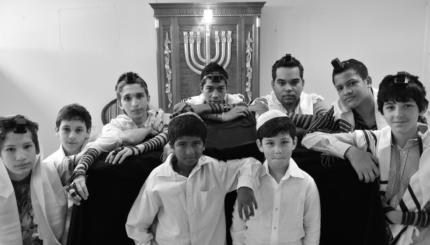Though always challenging, moving to a new community can be particularly difficult from a Jewish perspective. Not all Jews belong to synagogues, but most Jews do need to access Jewish community at some point, whether once a year or every day.
At certain times of the year, moving becomes even more challenging. It is difficult, for instance, to focus on finding High Holiday tickets or registering your children for religious school when you’re still getting lost on the way home from the grocery store. At the same time, tapping into Jewish community and its resources can alleviate some of the stress of moving by providing friendship, information, support, and recommendations (including where to find the best bagels in town–or a reliable babysitter).

Location, Location, Location
For traditionally observant Jews, living within a mile of a synagogue is a non-negotiable necessity, because driving on the Sabbath is forbidden according to Orthodox halakhah (Jewish law). But even if you drive to synagogue on Shabbat (or are a rare service attendee), living close to a synagogue or Jewish community center still has many advantages. The families and individuals who live in heavily Jewish neighborhoods enjoy a strong sense of community and access to important resources, such as kosher bakeries, Jewish daycare or eldercare facilities, and social networks. For families, proximity to the synagogue or Jewish day school reduces commute times and increases the convenience of socializing with other Jewish families.

Help us keep Jewish knowledge accessible to millions of people around the world.
Your donation to My Jewish Learning fuels endless journeys of Jewish discovery. With your help, My Jewish Learning can continue to provide nonstop opportunities for learning, connection and growth.
Another issue to consider is demographics. Singles should investigate community groups or synagogues where unmarried Jews hang out, but they might be less concerned about the location of the local Jewish day school. Neighborhoods may also be somewhat segregated by denomination or ethnicity; for example, in some cities, Jews of Persian descent will congregate around one particular synagogue.
Choosing a Synagogue
Some places are “one shul towns.” Other communities offer dozens of choices. Choosing a congregation that feels like “home” can make a big difference in the ease of getting comfortable in your new town.
Synagogue membership is not for everyone. There are many Jews who feel that they do not make use of the resources of a synagogue enough to merit the cost (actual or perceived) of synagogue membership. If you fit into this category, you may want to reconsider this choice when moving, particularly if moving to the South or Midwest; in those parts of the U.S., cities with smaller Jewish populations often have higher-than-average affiliation rates due to the lack of Jewish community organizations aside from synagogues.
Some people may choose a synagogue even before choosing a home. This can be a useful means of finding a community that is a good fit religiously, socially, and economically. Either way, ask yourself how far you are willing to travel to and from synagogue activities, including (if appropriate) religious school. A half-hour drive might seem like a short distance one-way, but that might be too long for three-day-a-week classes.
In general, synagogues want new members. Some congregations are better at recruiting them than others. Make sure to visit religious services. Meet with the rabbi, if at all possible. Talk with congregants. Let the clergy, staff, and members woo you, but also realize that you need to take into account both the warmth of the community and the resources you are seeking from a synagogue.
A growing trend is the presence of prayer, learning, and social gatherings apart from synagogues and other formal organizations. Ask around the community about informal minyanim or havurot (prayer groups outside of synagogues), study groups, play groups, and Shabbat dinner circles for Jewish singles and young couples. Many of these activities provide casual, friendly opportunities to newcomers.
Jewish Education
Not all communities provide choices in children’s education. Large communities, however, generally offer two main types of programs for school-aged children: day schools–which offer a full-day program of both secular and religious studies–and supplemental schools, often called “Hebrew,” “Sunday,” or “religious” schools. The pattern of Jewish schooling varies from community to community. In some cities, Jewish children–even from secular families–are more likely to attend day schools due to a perceived lack of quality in the local public schools. Other communities may only have supplemental (Saturday, Sunday, and/or weekday afternoon) programs available. Ask around and find out what the situation is in your new hometown.
Both types of schools come in different “flavors.” Day schools might or might not be associated with a specific Jewish movement (Reform, Conservative, or Orthodox). Schools that are not affiliated with a movement are called “community schools.” These schools, instead of promoting a specific type of Jewish ideology and lifestyle, are pluralistic. Among both day schools and supplemental programs, some schools are affiliated with synagogues and some are not; those that are may require synagogue membership.

Every Jewish school has its own personality and culture. The best way to understand the culture of a school is to visit it during school hours, meet the school’s administrators, and spend some time with parents and students. You will find significant cultural differences among schools , even those affiliated with the same movement. For example, some Orthodox day schools have a high number of non-Orthodox students; others do not. Some community schools observe kashrut (Jewish dietary laws) strictly, while others have a more lenient policy.
Another good way to get a sense of where each school’s priorities lay is to look at how time is divided among academic subjects. Day schools spend different proportions of their day on Judaic vs. secular studies. Religious schools vary not only in the number of classroom hours but also which subjects are taught. Check out school curricula to compare.
When choosing between a day school and a supplemental school education for your children, ask yourselves questions such as: What level of Hebrew mastery (if any) would I like my child to possess? Do I want my children to be in an environment where kashrutand Shabbat observance are priorities? Is it important that my children receive an education in Jewish texts aside from the Torah? How much racial and ethnic diversity do I want my children to experience in the classroom? Do I want my child to be in a single-sex or co-ed classroom? How much time do I want my children to spend in Jewish studies every week?
As a family, it is a good ideas to create a list of what you are looking for in a school before comparing information about schools.
Many parents, having decided upon a day school education for their children, experience “sticker shock” when they learn how much it costs. Day schools are private schools. Some funding assistance may be available, based on your family’s financial situation. Although very few supplemental schools will turn a family away on financial reasons, this is not the case with many day schools, which often do not have plentiful scholarship funds. Most school directors will work with you to come to a workable arrangement.
When you explore educational options, don’t limit your questions to information about formal schooling. It’s also important to make inquiries about Jewish daycare options, summer and winter camps, athletics, after-school programs, children’s services, youth groups, and museums.
Inconvenient Moves
Although there are ideal times of the year to move–summer being a prime example—sometimes one cannot choose when it happens. From a Jewish perspective, moving is particularly difficult close to or during the High Holy Days or Passover. Each holiday season presents special challenges.
If you are among the many individuals who find themselves looking for High Holy Day tickets at the last minute, United Jewish Communities, the organization linking all North American Jewish Federations, provides an annual list of free High Holy Day services. The list is available at the website www.ujc.org. For those people who still have an active membership at a synagogue, it may be possible to transfer your ticket privileges to a synagogue of the same movement in your new hometown. In addition, if you are considering a congregation for membership, you can often receive complimentary ttickets to some or all of their services.
Before Passover, the biggest concern for newly relocated people is often, “Where am I going to find kosher-for-Passoverfood?” For others, particularly singles and couples without children, the main concern might be finding a seder at which to be a guest. Many communities have guides available through the Jewish Federation or local synagogues that list the stores providing kosher and kosher-for-Passover food. In addition, these same organizations frequently offer community sedarim or a service matching individuals looking for meal with potential hosts.
In a new community and without the presence of a support system of friends and family, holy days and family events can be lonely, but they can also provide opportunities for interaction with the community. Make sure that you ask for whatever community support you need—you might actually get more than what you were looking for.
kosher
Pronounced: KOH-sher, Origin: Hebrew, adhering to kashrut, the traditional Jewish dietary laws.

Help us keep Jewish knowledge accessible to millions of people around the world.
Your donation to My Jewish Learning fuels endless journeys of Jewish discovery. With your help, My Jewish Learning can continue to provide nonstop opportunities for learning, connection and growth.
Shabbat
Pronounced: shuh-BAHT or shah-BAHT, Origin: Hebrew, the Sabbath, from sundown Friday to sundown Saturday.

Help us keep Jewish knowledge accessible to millions of people around the world.
Your donation to My Jewish Learning fuels endless journeys of Jewish discovery. With your help, My Jewish Learning can continue to provide nonstop opportunities for learning, connection and growth.
shul
Pronounced: shool (oo as in cool), Origin: Yiddish, synagogue.

Help us keep Jewish knowledge accessible to millions of people around the world.
Your donation to My Jewish Learning fuels endless journeys of Jewish discovery. With your help, My Jewish Learning can continue to provide nonstop opportunities for learning, connection and growth.


